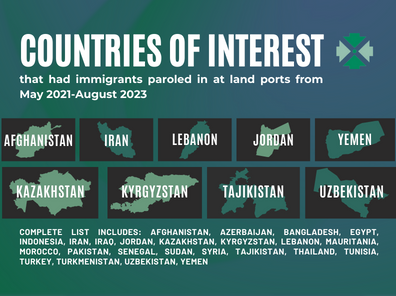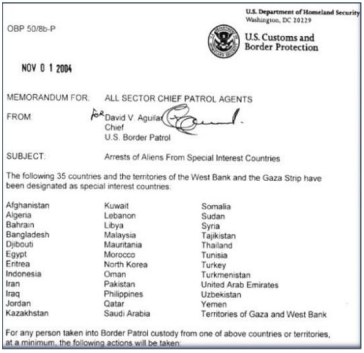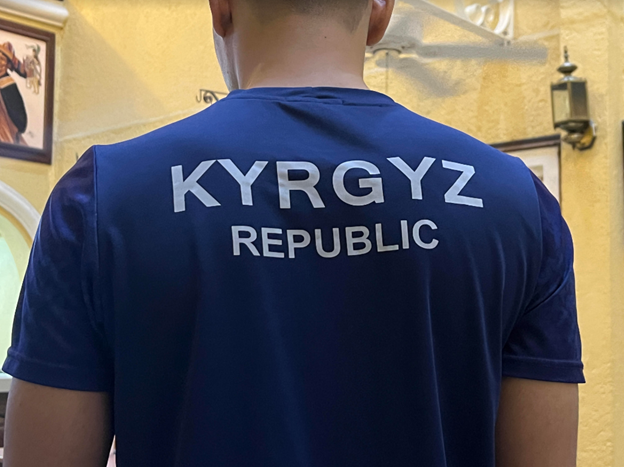Results 1 to 2 of 2
Thread Information
Users Browsing this Thread
There are currently 1 users browsing this thread. (0 members and 1 guests)
-
10-24-2023, 12:11 PM #1
Thousands of ‘Special Interest Aliens’ Posing Potential National Security Risks Enter
Thousands of ‘Special Interest Aliens’ Posing Potential National Security Risks Entering via CBP One App
October 24, 2023
Todd Bensman
Also see: “New Records Unveil Surprising Scope of Secretive ‘CBP One’ Entry Scheme”
For the two-plus decades after 9/11, professionals of the U.S. homeland security enterprise have fretted about illegal immigrants from foreign nations where Islamic terrorism groups operate who, without invitation or authorization, breach the Southwest Border and enter the country every year.
The professional presumption that these immigrants pose a greater national security risk than other illegal entrants has remained great enough, in fact, that federal agencies still tag them for enhanced security screening when encountered as “Special Interest Aliens” or SIAs (or due to the Biden administration’s aversion to the word “alien”, “Special Interest Migrants” or SIMs) to help ensure the strangers are not clandestine terrorist agents.
But new records released to the Center for Immigration Studies last week as part of a Freedom of Information Act lawsuit reveal that the Biden administration has been authorizing thousands of SIAs for escorted entries through land ports along the border since at least May 2021, using “CBP One” online interfaces such as a mobile phone app. Using this program, the administration has authorized the paroles into the country of some 7,332 SIAs from 24 of the roughly 35-40 U.S.-designated countries, including smatterings from Iran, Lebanon, Syria, Iraq, and Afghanistan, but the largest numbers coming from Muslim-majority former Soviet republics in Central Asia such as the Kyrgyz Republic, also known as Kyrgyzstan, (3,852) and Uzbekistan (1,843).1
[COLOR=rgba(0, 0, 0, 0.65)] [/COLOR]
[/COLOR]
These government-sanctioned SIA entries are very different from the surprise illegal border crossings of SIAs with which homeland security officials traditionally have had to contend in that these ones are pre-approved before their escorted port of entry crossings, their names and biometrics ostensibly having been run through criminal database checks (though such checks have been panned as grossly inadequate).
At issue with government-authorized entries of SIAs over the land ports is whether the Biden administration’s DHS is conducting effective enhanced security screening beyond the standard criminal database checks used for the more than 249,000 non-SIA immigrants the CIS FOIA records show it has paroled in since May 2021 through eight land ports.
That question comes at a time of heightened national concern about not only illegally entering SIA traffic at the southern border amid an historic mass migration but concern specifically about the record 270 aliens on the FBI’s terrorism watch list who have crossed illegally during the Biden administration. Because the administration has never disclosed that it was knowingly approving SIAs for its land port parole program, however, questions about vetting and purposeful choices to take on additional national security risk within the program have been neither asked nor answered.
“That’s a really hard target to analyze, and to just shoot from the hip and let them in is absolute insanity in my book,” said James G. Conway, a retired FBI counterterrorism agent who for years after 9/11 worked in Mexico trying to vet SIAs and detect terrorists among that flow. “How would you knowingly and wittingly bring people from terrorist countries into the United States with that level of vetting? Some of these terrorism countries don’t even have an electric grid let alone a computer system, and you can’t scrub them on databases that don’t exist. The whole thing is insane to me.”
[COLOR=rgba(0, 0, 0, 0.65)] [/COLOR]
[/COLOR]
The Old Normal. SIAs are not regarded as terrorists but, because they arrive as almost complete strangers from nations where avowed anti-U.S. terrorist groups are prevalent, homeland security protocols dating to a 2004 CBP Memorandum (right) and still largely in effect call for SIAs to be tagged and detained until they can go through extra security screening. As detailed at length in my book, America’s Covert Border War, the untold story of the Nation’s battle to prevent jihadist infiltration, one of the most important protocols requires face-to-face interviews with SIAs by FBI agents, DHS intelligence officers, or members of CBP’s Tactical Terrorist Response Team. Additionally, the agents might run individuals through additional classified databases, perhaps analyze personal belongings, contact foreign intelligence services or check U.S. military intelligence data, and attempt to validate statements made in the interviews. All of this was done to determine potential terrorism involvement. SIAs found to be clean were let back into the immigration system, or if derogatory information was found, probably deported to mitigate any risk.
But that enhanced screening activity occurred in times of relatively normal border flows, when maybe 3,000 to 4,000 SIAs per year were crossing.
The greatest mass migration crisis in American history is underway now, with literally millions crossing into the United States in a few years and overwhelming that infrastructure’s ability to keep up.
Credible reports now show that more than 75,000 SIAs were among those crossing illegally between just October 2022 and August 2023. Those numbers far surpass any DHS, CBP, or FBI ability to conduct enhanced security screening interviews or investigation of so many, as I recently testified before a subcommittee of the U.S. House Judiciary Committee. Border Patrol is so overwhelmed that it accidentally released an FBI watch-listed terrorist while trying to contain nonstop migrant surges, a Department of Homeland Security Office of Inspector General investigation of the incident shows. Other reporting shows that Mexico too has had trouble keeping watch-listed immigrants detained, such as in the case of a Yemeni suspected terrorist it accidentally released amid the crush of migrants, which includes an additional nearly two million that Border Patrol counted as “got-aways” because they were detected but not apprehended.

A Kyrgyzstani CBP One applicant in a Monterrey, Mexico, hotel proudly displays his country of origin as he waits for word about his application for a CBP One appointment. May 2023 photo by Todd Bensman.
Other strong indications have emerged that the Biden DHS has shown little interest in vetting the massive SIA traffic coming through the southern border. The Biden administration and human rights groups, for instance, in recent years have attempted to rein in CBP’s Tactical Terrorism Response Team activity along the border.
Eight months after Mexico’s first Muslim-only immigrant shelter opened in Tijuana in April 2022, for the express purpose of helping SIAs apply for CBP One appointments for parole, its director told me that no American law enforcement or intelligence officer had ever made contact about the possibility of vetting her visitors for terrorism.
When I asked one active-duty intelligence officer for DHS working on transnational crime issues such as human smuggling if the agency was interested in the shelter, the officer quickly answered: “No. We are not.”
Asked why, the officer responded that the shelter’s work was regarded as “humanitarian” and therefore immune from U.S. law enforcement interest.
“That is no longer within the scope of our criminal investigations,” the officer said of SIAs moving through the Mexico shelter and over land ports with CBP One appointments. “Because they are doing humanitarian work, they get to operate basically with impunity.”
It is against this backdrop that the Biden administration began approving CBP One applications from thousands of SIAs from 24 countries so far. The extent of vetting for them is up for much-warranted questioning, especially as the war between Israel and its neighbors escalates as expected and hundreds of thousands of inadmissible aliens per month continue to pour over it.
SIAs Do Get More Checks, But… Top DHS officials initially sold their CBP One app program to the American public on its ostensible vetting strength. According to government policy documents about it, CBP One applicants must pass “rigorous biometric and biographic national security and public safety screening and vetting.” CBP agents and U.S. processors, however, mainly run this information through criminal and domestic national security databases looking for matches to U.S. criminal records, warrants, and terrorism watch lists, those who do this work say.
But this vetting process is deeply flawed, experts say, because few if any CBP One applicants have ever lived in the United States to have committed a detectable crime
“The only thing we can query is information that we have,” former FBI Director James Comey once said of vetting foreign national refugees. “So, if we have no information on someone, they've never crossed our radar screen, they've never been a ripple in the pond, there will be no record of them there and so it will be challenging.”
Furthermore, a large percentage of those using the parole program hail from countries that would never feed criminal intelligence information to the Americans because they are diplomatically estranged, such as Venezuela, Cuba, and Nicaragua. Other nations are so developmentally challenged that they are incapable of keeping track of criminals or terrorism intelligence information.

Kyrgyzstani women at a Matamoros hotel waiting for their CBP One crossing appointments to come through study the app over breakfast. May 2023 photo by Todd Bensman.
It is in this context that Biden’s DHS, however, has apparently recognized the higher risk of the SIAs it is accepting for parole at the land ports.
A DHS source with direct knowledge of government vetting processes for the CBP One land port parole program, who was not authorized to speak or be identified, told CIS that all of the SIAs going through the CBP One appointment and parole at the land ports are run through more databases than all non-SIA applicants – these ones containing classified intelligence information – as a means to detect terrorism problems, the source said.
That news should go some way to allay national security concern about them – but not much, because little more than those extra database checks happen before the immigrants are crossed over to the American side for final parole processing, the government official said.
And, the same official acknowledged problems mentioned by other vetting experts, that database checks can’t detect information that is not in them.
The administration, nevertheless, is knowingly approving SIAs anyway from nations of national security concern whose governments are diplomatically hostile to the United States and would never cooperate, such as Iran (9 parolees), Syria (3), Yemen (1), and Afghanistan (154). But puzzlingly, the administration has approved for parole entries the largest numbers from former Soviet republics like Kyrgyzstan, Uzbekistan, and Tajikistan, which are not likely suited to maintain and share intelligence material.
Many are no doubt economic migrants seeking to take advantage of a unique opportunity to easily emigrate to a rich country before its leaders change their minds. One Kyrgyzstani I met at my hotel breakfast in Matamoros, Mexico, earlier this year told me, when I asked on a translation app why he had come, typed back: “Because the door was open.”
But citizens of these countries also happen to have been implicated in terror attacks and plots around the world and also joined ISIS in Iraq and Syria in fairly significant numbers to defend an Islamic caliphate against U.S. troops.
Problematic Nations. The terrorism section of the CIA’s “World Factbook” notes that U.S.-designated foreign terrorist groups have long operated in the dangerous neighborhood that all three of the most numerous of the SIAs hail from: the Kyrgyz Republic, Uzbekistan, and Tajikistan. Afghanistan is in the same tough neighborhood.
Among the groups operating in those three countries are the Islamic Jihad Union, the Islamic Movement of Uzbekistan, and ISIS-Khorasan. But there are many other extremist groups operating in the region too, such as the Islamic Renaissance Party of Tajikistan and various ISIS-affiliated groups the government has suppressed, according to the U.S. State Department’s 2021 Country Report on Terrorism for Tajikistan, and who might want to flee to the United States.
The same report notes that terrorist group members move throughout the mostly unguarded borders of these countries, with Tajikistan asserting that “thousands of militants” come and go from neighboring Afghanistan.
As one indication of public sentiment toward Islamic extremist ideology in the Kyrgyz Republic, an estimated 850 of its citizens reportedly joined ISIS between 2013 and 2015, and regional scholars insist the real number is higher, according to George Washington University’s Counter Extremism Project.
Uzbekistan also has figured prominently in global counterterrorism efforts, in part because the internationally designated terrorist organization known as the Islamic Movement of Uzbekistan has had regional and global reach and regularly conducts attacks. Extremists from Uzbekistan have been implicated in U.S. attacks and plots too. Hundreds of Uzbeks also fought for ISIS and many have returned.
Conway told me he was stunned to learn the Biden administration was taking such risks in willingly approving entries of SIAs from Central Asia, a region where anti-American sentiment runs sky high and security vetting must be done hurriedly under the pressure of mass migration crisis.
“What’s the motivation? I mean, why would they do that?” he asked of the Biden administration.
End Note
1 For the original publicly available government countries-of-national-security concern list, see: David V. Aguilar, "Arrests of Aliens from Special Interest Countries", U.S. Customs and Border Protection memorandum, November 1, 2004, and also; Department of Homeland Security joint assessment with the California State Terrorism Threat Assessment Center, "Special Interest Alien Use of the California-Mexico Border", August 2009. This document was obtained while the author was working as a journalist in Texas. The NCTC intelligence report "2006 SIA Trends Reveal Vulnerabilities Along Route to US", obtained by the author while working as a journalist, listed the countries as follows: Afghanistan, Algeria, Bahrain, Bangladesh, Djibouti, Egypt, Eritrea, Indonesia, Iran, Iraq, Jordan, Kazakhstan, Kuwait, Lebanon, Libya, Malaysia, Mauritania, Morocco, Oman, Pakistan, the Philippines, Qatar, Saudi Arabia, Somalia, Sudan, Syria, Tajikistan, Tunisia, Turkey, Turkmenistan, the United Arab Emirates, Uzbekistan, and Yemen, as well as the territories of Gaza and the West Bank. DHS/ICE also recognized Thailand as a country of national security concern. For a reference guide to this issue, see: Todd Bensman, Terrorist Infiltration Threat at the Southwest Border, Center for Immigration Studies, August 2018
https://cis.org/Report/Thousands-Spe...tering-CBP-OneLast edited by GeorgiaPeach; 10-24-2023 at 02:15 PM.
Matthew 19:26
But Jesus beheld them, and said unto them, With men this is impossible; but with God all things are possible.
____________________
Join our efforts to Secure America's Borders and End Illegal Immigration by Joining ALIPAC's E-Mail Alerts network (CLICK HERE)
-
10-24-2023, 02:13 PM #2
(Link in original story. PDF copy at Link)
OBP 50/8b-P
NOV01, 2004
U.S.DepartmenotfHomelandSecurity Washington, DC 20229 I
U.S.Customs and Border Protection
MEMORANDUM FOR: ALL SECTOR CHIEF PATROL AGENTS
FROM: David V. Aguilar
Chief
U.S. Border Patrol
SUBJECT: Arrests of Aliens From Special Interest Countries
The following 35 countries and the territories of the West Bank and the Gaza Strip have been designated as special interest countries:
Afghanistan Algeria
Bahrain
Bangladesh Djibouti Egypt Eritrea Indonesia Iran
Iraq
Jordan Kazakhstan
Kuwait Somalia Lebanon Sudan Libya Syria
Malaysia Tajikistan Mauritania Thailand Morocco Tunisia
North Korea Oman Pakistan Philippines Qatar
Saudi Arabia
Turkey
Turkmenistan
United Arab Emirates
Uzbekistan
Yemen
Territories of Gaza and West Bank
For any person taken into Border Patrol custody from one of above countries or territories, at a minimum, the following actions will be taken:
.Contact .Contact .Contact .Contact .Copy .Generate
Sector Communications for initial records checks.
the National Targeting Center for additional records checks.
the local JTTF for follow-on interviews.
the Station and/or Sector Intelligence Unit for follow-on interviews.
or scan any pocket litter of possible intelligence value.
and submit within 1 hour a Significant Incident Report to the U.S. Customs
and Border Protection Commissioner's Situation Room.
.If intelligence is developed, complete and forward a G-392 Intelligence Report through
Border Patrol intelligence channels.
.Enroll all aliens 14 years of age or older from the above countries or territories who are
amenable to removal proceedings into the ENFORCE/IDENT systems and screen them through IAFIS, without exception.
"'"""'1'
'I'; 'p'
-2-
I
This memorandum supersedes the memorandum issued by Headquarters Office of Border Patrol dated, February 24,2004, entitled "Apprehensions of Aliens From Special Interest Countries."
Ensure that a copy of this memorandum is provided to all supervisors and agents under your command and that they comply with the procedures outlined in this memorandum.
Due to the urgency of this request, please confirm that you have received, distributed, and implemented these procedures via e-mail notification to Chief of Staff, Associate Chief Carlos X. Carrillo.
Staff may direct questions to Assistant Chief Johnny Meadors at 202-344-2050
https://cis.org/sites/default/files/...uilar_memo.pdfLast edited by GeorgiaPeach; 10-24-2023 at 02:32 PM.
Matthew 19:26
But Jesus beheld them, and said unto them, With men this is impossible; but with God all things are possible.
____________________
Join our efforts to Secure America's Borders and End Illegal Immigration by Joining ALIPAC's E-Mail Alerts network (CLICK HERE)
Similar Threads
-
Exclusive: 61K ‘Special Interest Aliens’ Entered U.S. through Biden’s Open Border in
By Scott-in-FL in forum illegal immigration News Stories & ReportsReplies: 0Last Post: 10-07-2023, 02:44 PM -
A Shocking Number of Illegal Aliens Flagged as National Security Risks
By Scott-in-FL in forum illegal immigration News Stories & ReportsReplies: 0Last Post: 09-08-2023, 07:01 AM -
Experts Warn of National Security Risks from DACA
By GeorgiaPeach in forum illegal immigration News Stories & ReportsReplies: 1Last Post: 10-17-2017, 08:47 AM -
Napolitano: DHS Is Working with Mexico on ‘Special Interest Aliens’ Threat Along U.S.
By Ratbstard in forum illegal immigration News Stories & ReportsReplies: 1Last Post: 01-19-2012, 03:23 PM -
FBI Warns of 'Special Interest' Aliens
By Daylights in forum illegal immigration News Stories & ReportsReplies: 5Last Post: 03-10-2005, 11:02 AM


 1Likes
1Likes LinkBack URL
LinkBack URL About LinkBacks
About LinkBacks




 Reply With Quote
Reply With Quote


72 Hours Till Deadline: Durbin moves on Amnesty
04-28-2024, 02:18 PM in illegal immigration Announcements